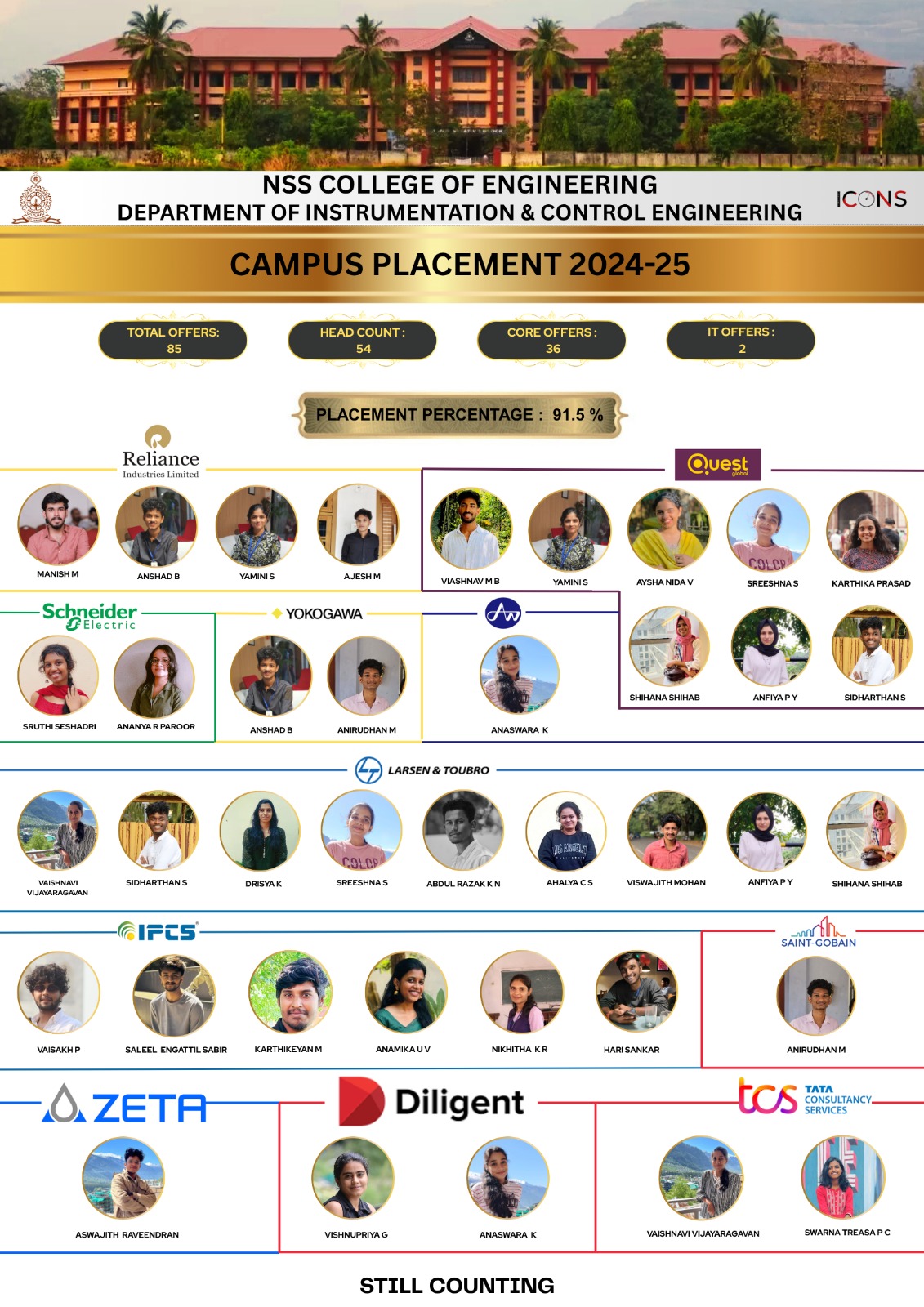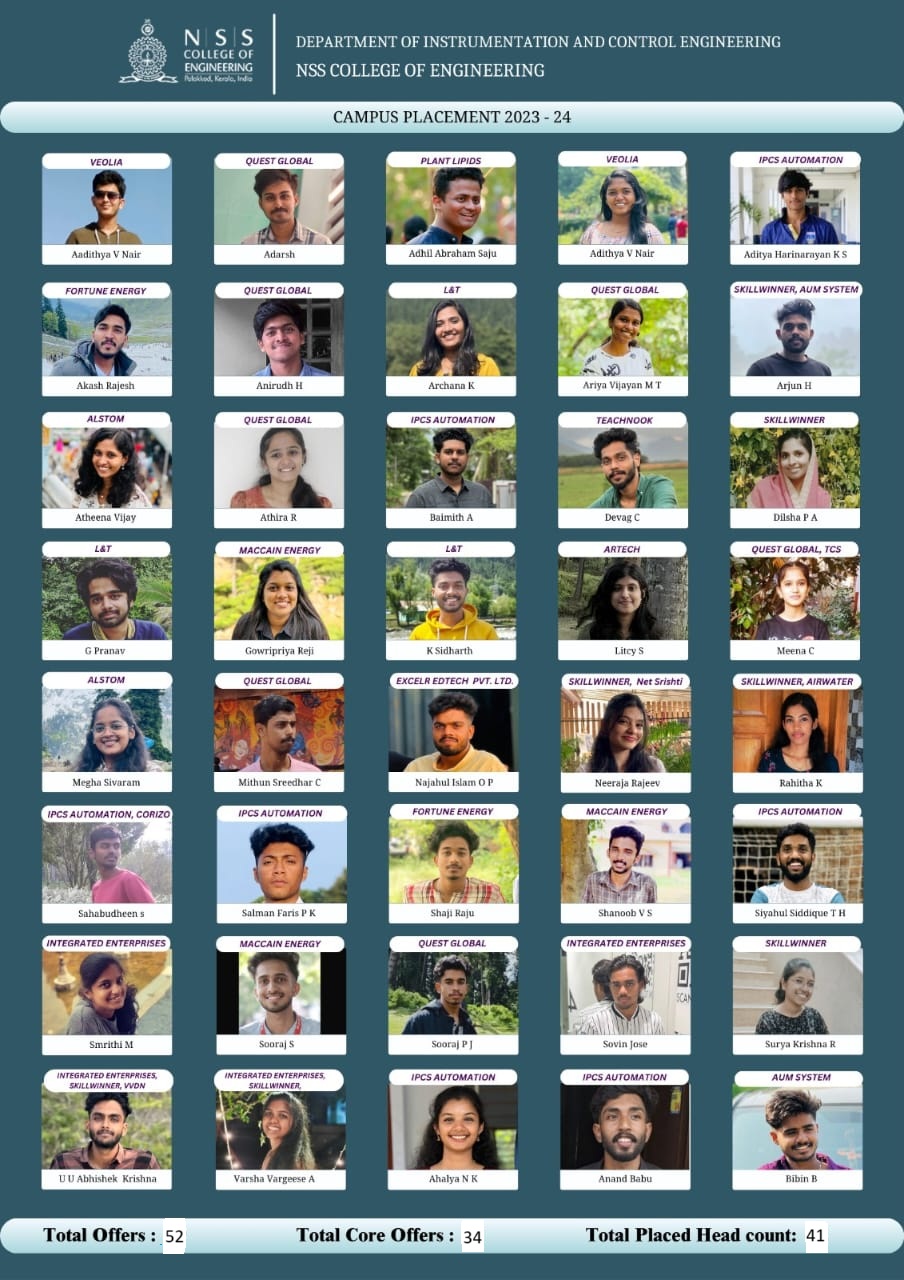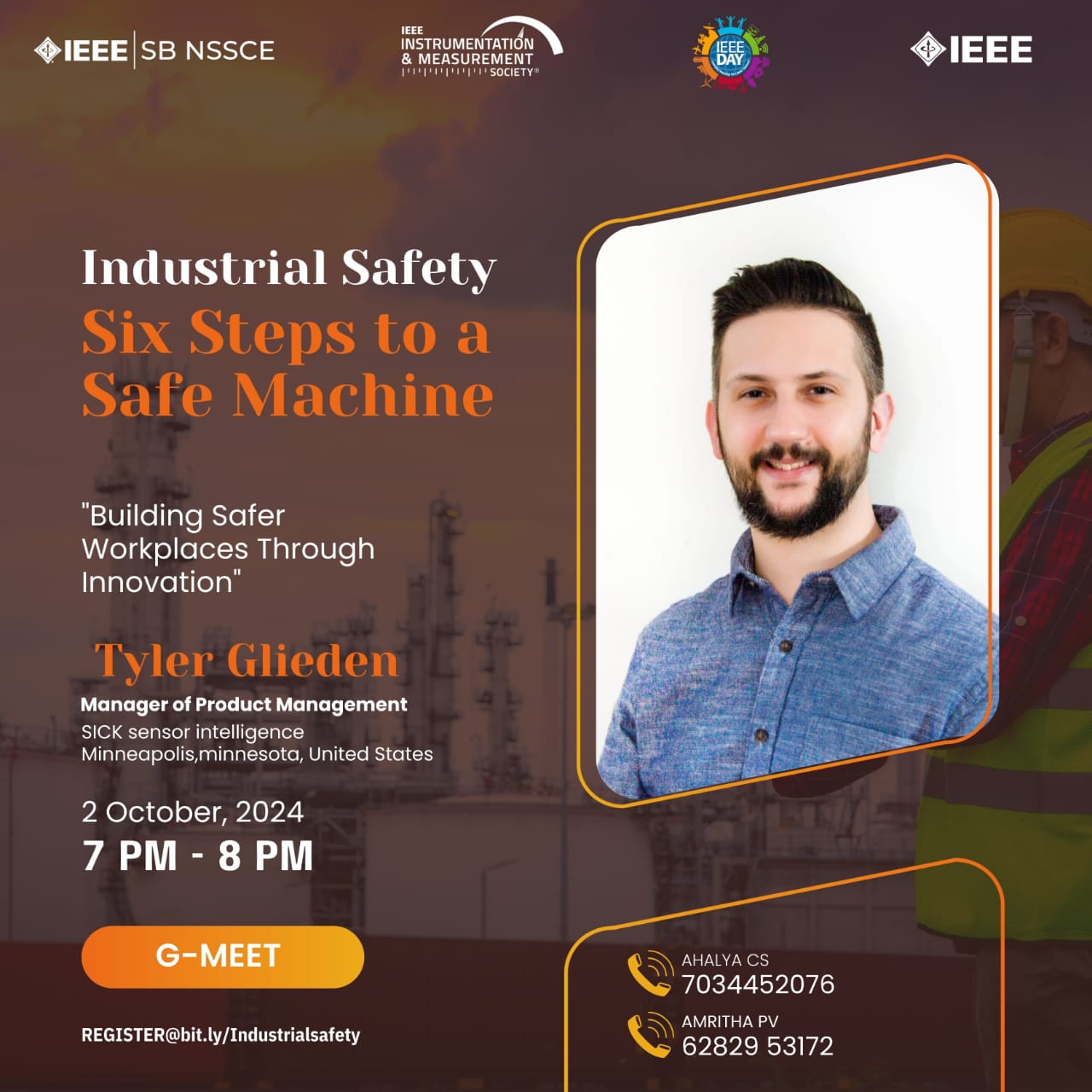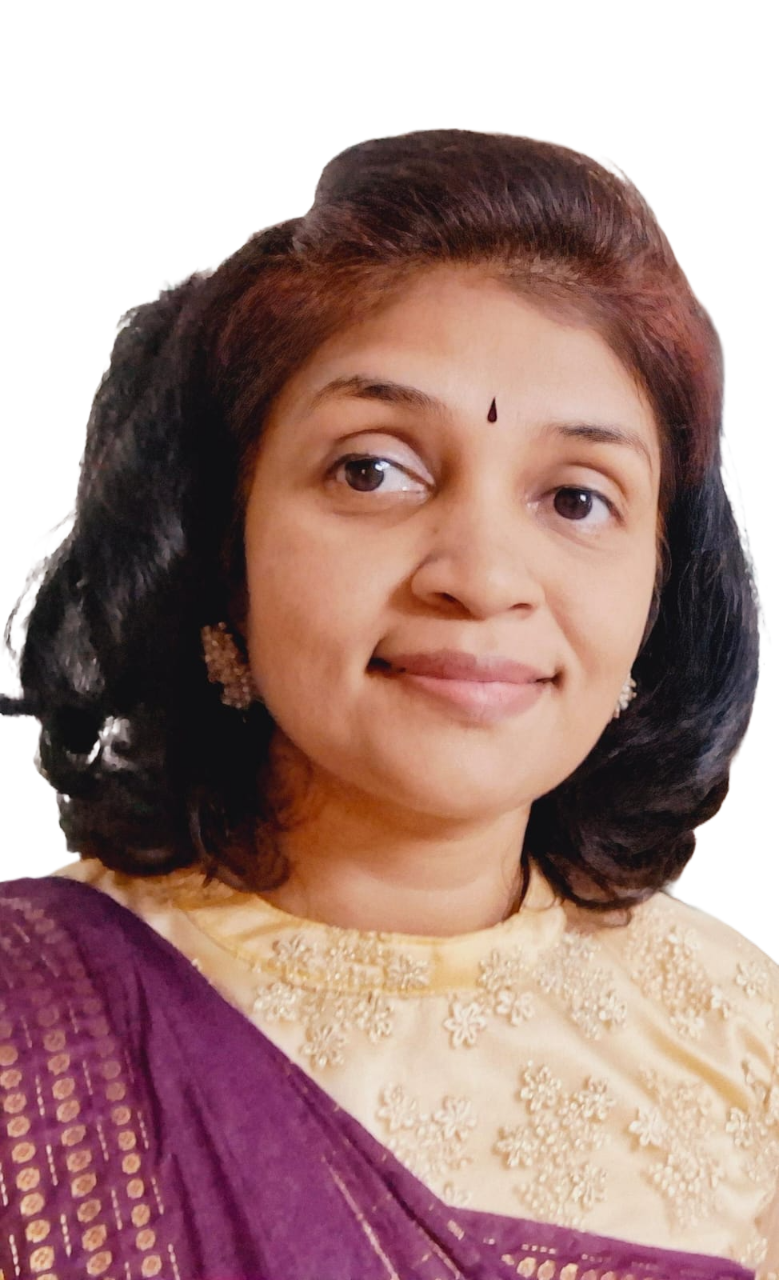Achievements & Activities
Department of Instrumentation & Control Engineering
The department of Instrumentation & Control Engineering, the only one of its kind in government /aided sector was established in 1980. The department offers a full time B.Tech degree course in Instrumentation & Control Engineering with a total intake of 72, and M.Tech degree in Biomedical Engineering with a total intake of 18. This department is an approved research center of APJ Abdul Kalam Technological University. Department has been backed up by efficient, dedicated and specialized faculty and they work with dedication to keep in pace with the ever-changing control and instrumentation scenario. The department has an excellent placement record, with its alumni working all around the globe in reputed companies in coveted positions. The alumni and the experts from industry visit the department periodically and give lectures, demonstrations, and career guidance to the students. The students are also given exposure to the industrial environment through industrial visits and industrial training. It's indeed a matter of pride for the department that numerous eligible final year students are placed in prestigious MNCs every year.
OUR VISION
OUR MISSION
| PEO | Program Educational Objectives |
|---|---|
| PEO1 | Graduate Instrumentation and Control engineers will improve their professional and academic competence by acquiring more knowledge in the area of instrumentation and control engineering through research |
| PEO2 | Graduate Instrumentation and Control Engineers will be model engineers with strong social commitment |
| PEO3 | Graduate Instrumentation and Control Engineers will become technological leaders in leading industries and entrepreneurs with professional skills and ethical values |
| PO | Program Outcomes |
|---|---|
| PO1 | Engineering knowledge: Apply knowledge of mathematics, science, engineering fundamentals, and an engineering specialization to the solution of complex engineering problems. |
| PO2 | Problem analysis: Identify, formulate, review research literature, and analyze complex engineering problems reaching substantiated conclusions using first principles of mathematics, natural sciences, and engineering sciences. |
| PO3 | Design/development of solutions: Design solutions for complex engineering problems and design system components or processes that meet the specified needs with appropriate consideration for the public health and safety, and the cultural, societal, and environmentalconsiderations. |
| PO4 | Conduct investigations of complex problems: Use research-based knowledge and research methods including design of experiments, analysis and interpretation of data, and synthesis of the information to provide valid conclusions. |
| PO5 | Modern tool usage: Create, select, and apply appropriate techniques, resources, and modern engineering and IT tools including prediction and modeling to complex engineering activities with an understanding of the limitations. |
| PO6 | The engineer and society: Apply reasoning informed by the contextual knowledge to assess societal, health, safety, legal and cultural issues and the consequent responsibilities relevant to the professional engineering practice. |
| PO7 | Environment and sustainability: Understand the impact of the professional engineering solutions in societal and environmental contexts, demonstrate the knowledge of, and need for sustainable development. |
| PO8 | Ethics: Apply ethical principles and commit to professional ethics, responsibilities, and norms of the engineering practice. |
| PO9 | Individual and teamwork: Function effectively as an individual, and as a member or leader in diverse teams, and in multidisciplinary settings. |
| PO10 | Communication: Communicate effectively on complex engineering activities with the engineering community and with society, such as, being able to comprehend and write effective reports and design documentation, make effective presentations, and give and receive clear instructions. |
| PO11 | Project management and finance: Demonstrate knowledge and understanding of the engineering and management principles and apply these to one’s own work, as a member and leader in a team, to manage projects and in multidisciplinary environments. |
| PO12 | Life-long learning: Recognize the need for, and have the preparation and ability to engage independent and life-long learning in the broadest context of technological change. |
| PSO | Program Specific Outcomes |
|---|---|
| PSO1 | Interpret the static characteristics and functioning of industrial, optical, electrical, mechanical, analytical, aeronautical, petrochemical and biomedical instruments used for measurements, calibration and control |
| PSO2 | Specify, design, develop, implement and test electronic systems that perform analog and digital signal processing functions. |
| PSO3 | Analyze, Specify, design, develop, implement and test control, and automation systems |
| PEO | Program Educational Objectives |
|---|---|
| PEO1 | Ability to identify ever-changing healthcare needs and apply the knowledge acquired to conduct research and development for solving complex biomedical engineering problems |
| PEO2 | Ability to adapt to the dynamic challenges in biomedical technology to support industry, allied healthcare sectors and academia |
| PEO3 | Ability to become technological leaders in leading industries and entrepreneurs with professional skills and ethical values for the betterment of the society |
| PO | Program Outcomes |
|---|---|
| PO1 | An ability to independently carry out research/investigation and development work in engineering and allied streams |
| PO2 | An ability to communicate effectively, write and present technical reports on complex engineering activities by interacting with the engineering fraternity and with society at large |
| PO3 | An ability to demonstrate a degree of mastery over the area as per the specialization of the program. The mastery should be at a level higher than the requirements in the appropriate bachelor program |
| PO4 | An ability to apply stream knowledge to design or develop solutions for real world problems by following the standards |
| PO5 | An ability to identify, select and apply appropriate techniques, resources and state-of-the-art tool to model, analyse and solve practical engineering problems |
| PO6 | An ability to engage in life-long learning for the design and development related to the stream related problems taking into consideration sustainability, societal, ethical and environmental aspects |
| PO7 | An ability to develop cognitive load management skills related to project management and finance which focus on Entrepreneurship and Industry relevance |
| PSO | Program Specific Outcomes |
|---|---|
| PSO1 | Ability to develop and apply methods to analyse information from complex physiological signals, images and systems for theragnostic decision making |
| PSO2 | Ability to analyse, design and prototype medical device, and manage healthcare systems for the society at large |
| SI.NO | Funding agency | Project title | Investigator | Amount (Rs) | Duration |
|---|---|---|---|---|---|
| 1 | KSCSTE-ETP | Development of malayalam syllable recognition system using facial EMG signals | Dr. Venugopal G | 21,26,000 | 2022-25 |
| 2 | CERD, Trivandrum | Detection of Pipeline Crack and Clog Detection Robot using Convolutional Neural Network | Nikhil Binoy C | 7, 500/- | 1 Year, 2021-2022 |
| 3 | CERD,TRIVANDRUM | DETECTION OF PIPELINE CRACK AND CLOG DETECTION ROBOT USING CONVOLUTIONAL NEURAL NETWORK | Nikhilbinoy C | 7500 | 2021-21 |
| 4 | Science and Engineering Research Board, Department of Science and TRechnology, Government of India | Development of assessment protocols for aspiring athletes using surface electromyography signals | Dr. Venugopal G | 35,64,738 | 2020-2023 |
| 5 | AICTE, New Delhi MODROB | Removal of obsolescence and modernisation of industrial instrumentation lab | Dr. Venugopal G | 12,62,500/- | 2 Years 2020-2022 |
| 6 | AICTE, New Delhi MODROB | Removal of obsolescence and modernisation of industrial instrumentation lab | Dr. Venugopal G | 12,62,500/- | 2 Years 2020-2022 |
| 7 | CERD,Trivandrum | Gas leakage prediction and automation using Artificial neural network and Internet of Things | Prof. Nikhil Binoy C and Dr. Retheep Raj |
30,000/- | 1 Year 2020-21 |
| 8 | KSCSTE | Intelligent transport system for drivers | Prof. Indu T | 10,000/- | 1 Year 2020-21 |
| 9 | Center of Excellence for disability studies, Trivandrum | Electromyography signal driven prosthetic limb | Dr. Retheep Raj Dr. Venugopal G |
3,00,000/- | 1.5 Years 2019-2021 |
| 10 | Center of Excellence for disability studies, Trivandrum | Electromyography signal driven prosthetic limb | Dr. Retheep Raj and Dr. Venugopal G |
3,00,000/- | 1.5 Years 2019-2021 |
| 11 | CERD, Trivandrum | Wearable gadget for navigation of blind people | Dr. Anish M N | 22,500/- | 1 Year 2019-20 |
| 12 | CERD, Trivandrum | Wearable gadget for navigation of blind people | Dr. Anish M N | 22,500/- | 1 Year 2019-20 |
| 13 | CERD, Trivandrum | Surface electromyography based prosthetic limb | Dr. Retheep Raj and Prof. Nikhil Binoy C |
40,000/- | 1 Year 2019-20 |
| 14 | CERD, Trivandrum | Surface electromyography based prosthetic limb | Dr. Retheep Raj | 40,000/- | 1 Year 2019-20 |
| 15 | CERD, Trivandrum | FPGA based portable devices for analysing neuromuscular conditions using surface EMG signals | Dr. Venugopal G | 30,000/- | 1 Year 2019-20 |
| 16 | CERD, Trivandrum | FPGA based portable devices for analysing neuromuscular conditions using surface EMG signals | Dr. Venugopal G | 30,000/- | 1 Year 2019-20 |
| 17 | CERD, Trivandrum | Automated swimming trainer suit for beginners | Sivakumar K S | 50,000/- | 1 Year 2019-20 |
| 18 | CERD, Trivandrum | Automated swimming trainer suit for beginners | Sivakumar K S | 50,000/- | 1 Year 2019-20 |
| 19 | CERD, Trivandrum | Characterization of effect of muscle fiber types in fatigue progression using surface electromyography signals | Dr. Venugopal G | 1,95000/- | 3 Years 2018-2021 |
| 20 | CERD, Trivandrum | Characterization of effect of muscle fiber types in fatigue progression using surface electromyography signals | Dr. Venugopal G | 1,95000/- | 3 Years 2018-2021 |
| 21 | CERD, Trivandrum | Wireless intravenous bottle monitoring system for hospitals | Dr. Venugopal G Prof. Retheep Raj |
45,000/- | 1 year 2018-2019 |
| 22 | CERD, Trivandrum | Wireless intravenous bottle monitoring system for hospitals | Dr. Venugopal G Dr. Retheep Raj |
45,000/- | 1 year 2018-2019 |
| 23 | KSCSTE | SEEDBOT- AN AUTOMATED SEED PLANTING ROBOT | Prof. Retheep Raj and Prof. Nikhil Binoy C |
9000/- | 1 year 2018-2019 |
| 24 | KSCSTE | SEEDBOT- AN AUTOMATED SEED PLANTING ROBOT | Retheep Raj Nikhil Binoy C |
9000/- | Completed 2018-19 |
Department Advisory Board (DAB) of the Department of Instrumentation and Control Engineering is constituted for the Academic Year 2025-26 with the following members.
| Name | Designation | Role |
|---|---|---|
| Dr. Anjali S Nair | HoD, ICED, NSS College of Engineering Palakkad | Chairman |
| Dr. Anish M N | Professor, ICED, NSS College of Engineering Palakkad | PG Coordinator |
| Dr. Venugopal G | Professor, ICED, NSS College of Engineering Palakkad | UG Dean |
| Dr. Vinod A Prasad | Professor, Infocomm Technology Cluster, Singapore Institute of Technology | Academic Expert |
| Mr. Manoj Vivek | GM & CoE Leader (Energy & Industrial Automation), QuEST Global, Technopark, Trivandrum | Industrial Expert |
| Mr. Jayaraj K B | GM (FEDO & FEW), FACT Kochi, Kerala | Industrial Expert |
| Dr. Suresh M | Deputy Director, FCRI India | Industrial Expert |
| Dr. Deepu M | Professor, Department of Aerospace Engineering, Indian Institute of Space Science and Technology, Trivandrum | Academic Expert |
| Dr. Pramod Pisharady | Assistant Professor, Center for Magnetic Resonance Research, Department of Radiology, University of Minnesota Medical School, USA | Academic Expert |
| Mr. Rajesh Kumar | Principal Engineering Manager / DGM, Intelligent Automation COE & Sustainability, Nissan Digital | Industrial Expert |
| Prof. Nikhil Binoy C | Professor, ICED, NSS College of Engineering Palakkad | Accreditation Coordinator |
| Dr. Retheep Raj | Professor, ECED, NSS College of Engineering Palakkad | Faculty |
| Dr. Smitha B | Professor, ECED, NSS College of Engineering Palakkad | IQAC Coordinator |
| Mr. Mazin K H | 3rd Year Class Representative | IC Association Representative |
| Mrs. Iswarya Devi R | MTech 2nd year student | PG Class representative |
| Abhijith M | PhD scholar | PhD representative |
IC ASSOCIATION
| Position | Class | Name |
|---|---|---|
| Staff Incharge | - | Anjali S Nair |
| Chairman | S7 ICE | Mazin K H |
| Vice Chairman | - | Nidina S Manu |
| Secretary | S5 ICE | J Ram Pazhaniyappan |
| Immediate Chairman | S3 ICE | Joel Poulose |
| Joint Secretary | MTECH | Pavithra Sebastian |
| Treasurer | - | Bhavana Priya P K |
| Joint Treasurer | S3 ICE | Shamil Juman A T |
| Internship | S7 ICE | Rahul Manoj K T |
| Program Coordinator | S3 ICE | Arundhathy S |
| Editor | S3 ICE | Anusree C G |
| PR Head | S5 ICE | Dhankrishna P D |
| Technical Coordinator | S5 ICE | Aswath M Nair |
| Content Head | S5 ICE | Ajanya P K |
| Website Head | S3 ICE | K Sarath Sankar |
| Design Head | S7 ICE | Sanjeev Santhosh B S |
| Placement Activity Manager | S7 Placement Rep | Joyel Thomas, Ambika Gayathri |
| Placement Activity Manager | M1 Placement Rep | Aiswarya, Vaishak |
| NSS Representative | S7 ICE | Varsha V |
| IEEE Student Chapter Representative | S3 ICE | Meenakshy R |
| ISTE Students Chapter Rep | S5 ICE | Gayathri P R |
| EDC Rep | S7 ICE | Jeeva Chacko |
| IMS Chairman | S7 ICE | Amritha PV |
| IMS Vice Chairman | S3 ICE | Harinandan |
News & Events

.jpg)
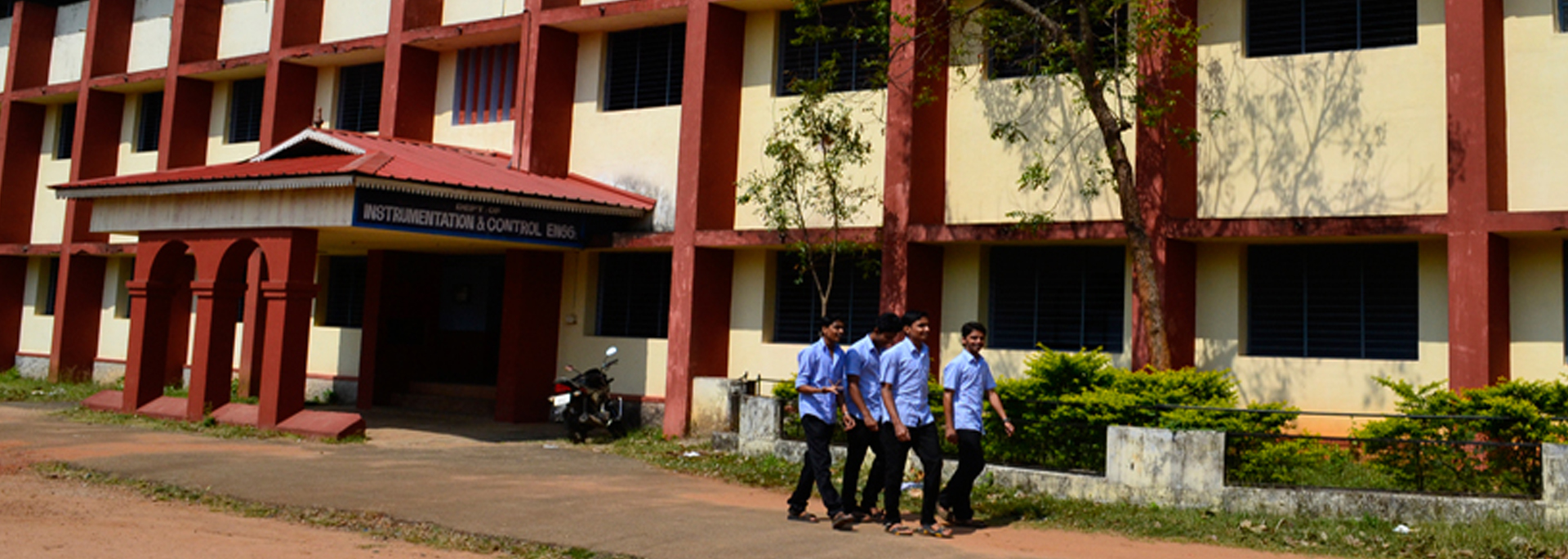
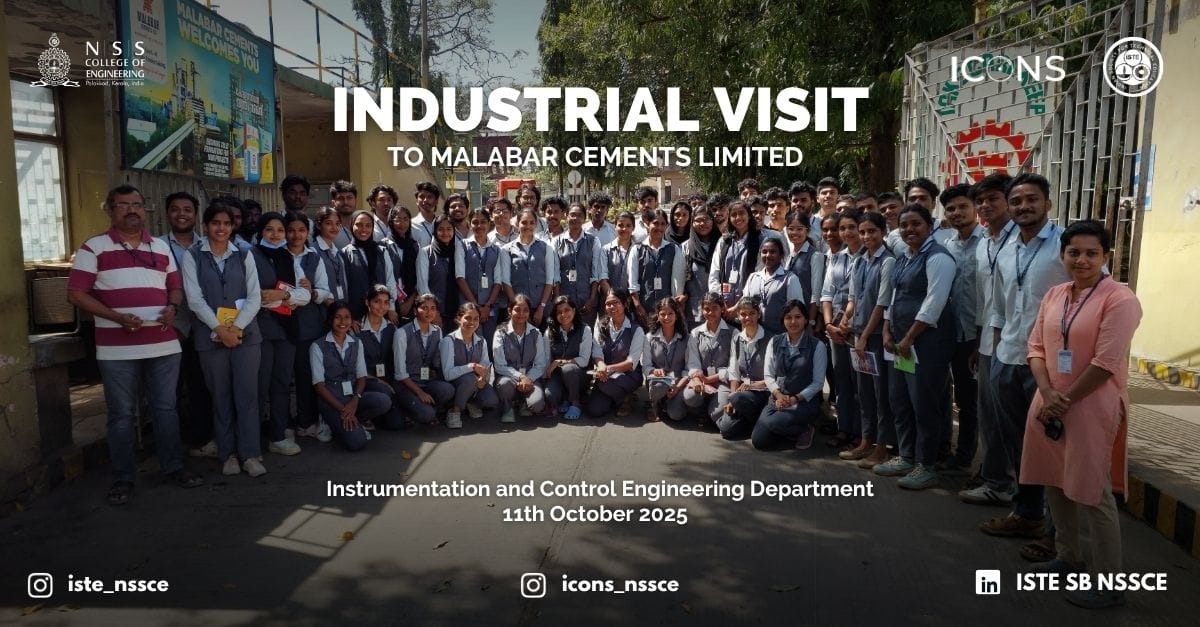
.jpg)
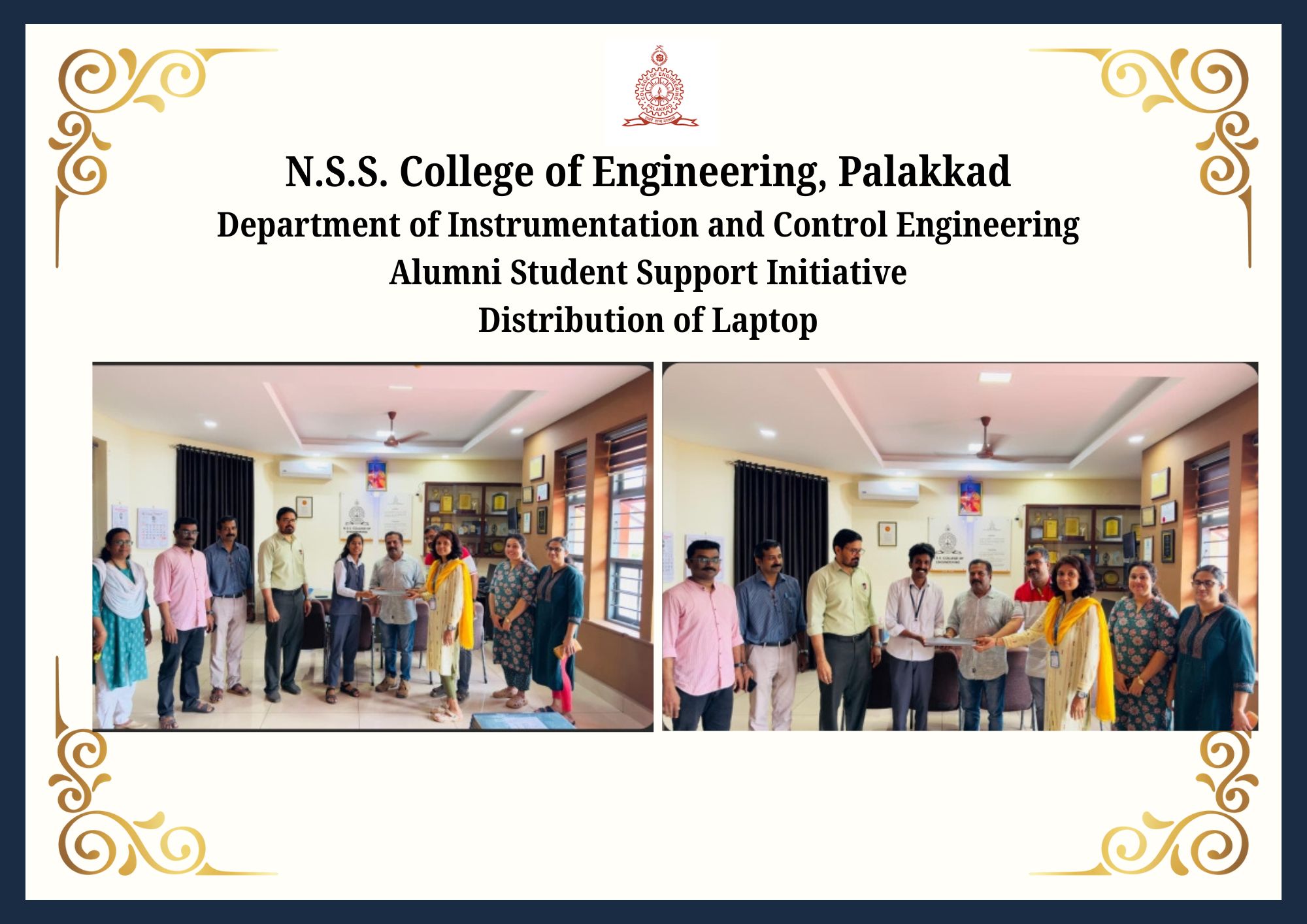

.jpg)
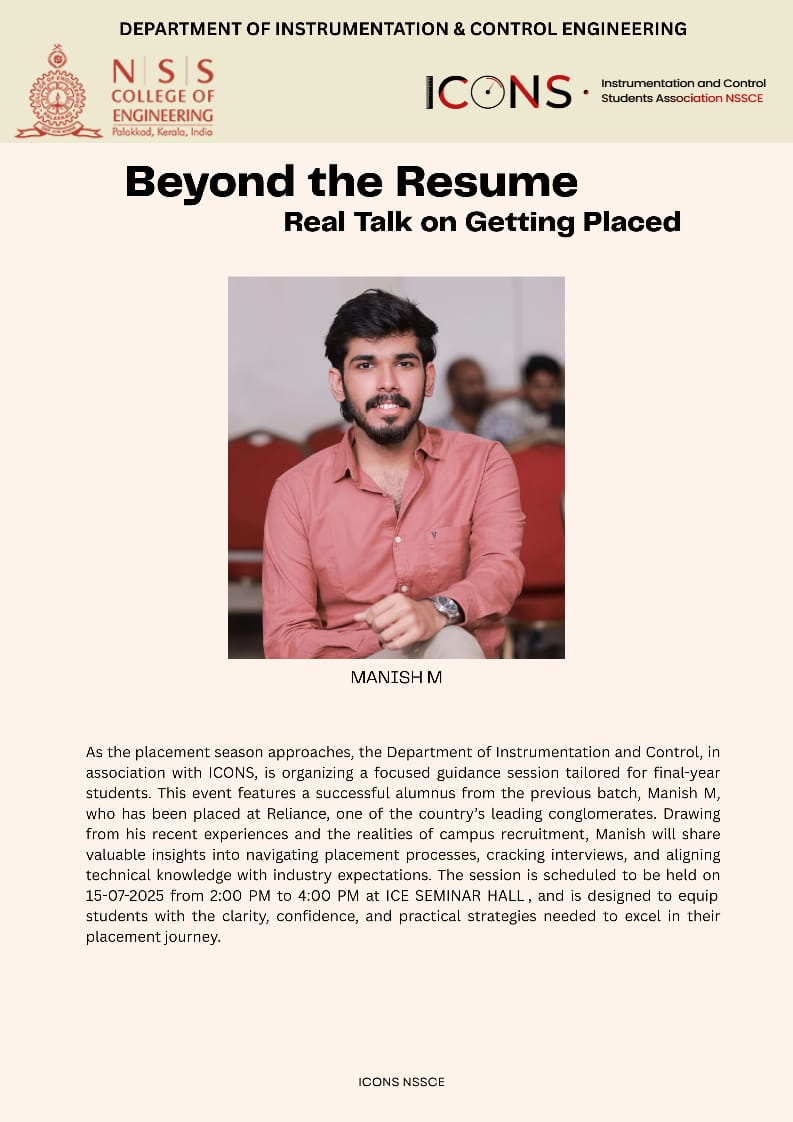
.png)
